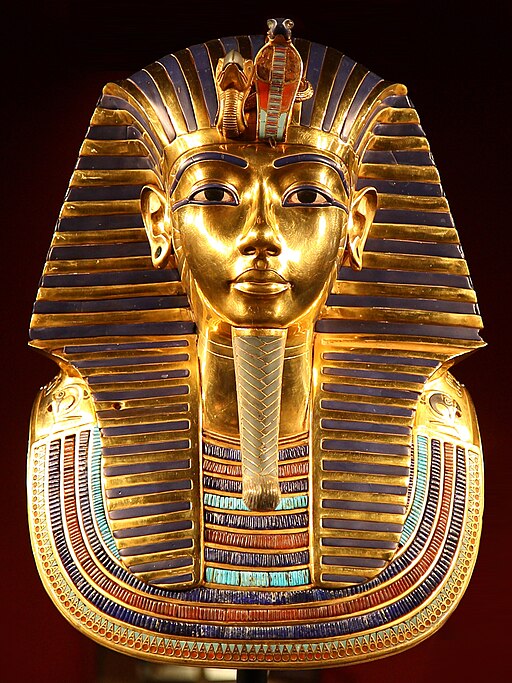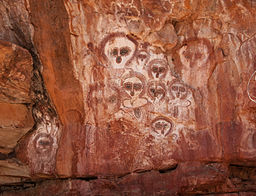
“Down on His Luck” by Frederick McCubbin depicts a disheartened swagman or unlucky gold prospector, sitting by a campfire brooding over his luck.
McCubbin’s iconic paintings of romanticized rural and pioneer life are as famous today as they were with his audiences in the 1900s. According to an 1889 review:
“The face tells of hardships, keen and blighting in their influence, but there is a nonchalant and slightly cynical expression, which proclaims the absence of all self-pity … McCubbin’s picture is thoroughly Australian in spirit.”
The surrounding bush is painted in subdued tones, also reflecting the somber and contemplative mood. The scene was located near the Box Hill artists’ camp outside Melbourne.
Note the prominent eucalyptus plant placed prominently in the foreground and painted in bold detail, reflecting McCubbin’s love of the Australian bush. One can imagine the campfire crackles while birds and cicadas call from the trees.
“Down on his luck” is one of the first of a series of large-scale figure paintings by McCubbin, inspired by Australia’s early history. The clothing, billy, campfire, and rolled up blanket portrayed in the picture were typical of workers in the bush.
This image of the prospector or swagman or bush worker offered a certain nobility. Independent of urban demands, breathing the air of the bush, and free to make his own decisions. “Down on his luck,” but with the opportunity that tomorrow will bring better luck.
Swagman
A swagman was a transient laborer who traveled by foot from farm to farm carrying his belongings in a swag or bedroll. The term originated in Australia in the 19th-century.
Swagmen were particularly common in Australia during times of economic uncertainty, such as the 1890s and the Great Depression of the 1930s.
Many unemployed men traveled the rural areas of Australia on foot, their few meager possessions rolled up and carried in their swag.
Typically, they would seek work in farms and towns they traveled through, and in many cases, the farmers would provide food and shelter in return for some menial task.
The figure of the “jolly swagman,” represented most famously in Banjo Paterson’s bush poem “Waltzing Matilda,” became a folk hero in 19th-century Australia.
Today it is still seen as a symbol of anti-authoritarian values that Australians considered to be part of the national character.
“Once a jolly swagman camped by a billabong
Under the shade of a coolibah tree,
And he sang as he watched and waited till his “Billy” boiled,
“You’ll come, a-waltzing Matilda, with me.”
“Waltzing Matilda” is Australia’s best-known bush ballad. The song narrates the story of an itinerant worker, or “swagman,” making a drink of billy tea at a bush camp and capturing a stray jumbuck (ram) to eat.
When the jumbuck’s owner and policemen pursue the swagman for theft, he declares, “You’ll never catch me alive!” He commits suicide by drowning himself in a nearby billabong (watering hole), after which his ghost haunts the site.
The original lyrics were written in 1895 and were first published as sheet music in 1903. Extensive folklore surrounds the song and the process of its creation. T
here are more recordings of “Waltzing Matilda” than any other Australian song on the record.
Frederick McCubbin
Frederick McCubbin (1855 – 1917) was an Australian artist and prominent member of the Heidelberg School art movement, also known as Australian Impressionism.
McCubbin was born in Melbourne, Australia, and worked for a time as solicitor’s clerk, a coach painter, and in his family’s bakery business.
All the while studying art at the National Gallery of Victoria’s School of Design, where he met Tom Roberts and studied under Eugene von Guerard.
He also studied at the Victorian Academy of the Arts and sold his first painting in 1880 at the age of twenty-five.
McCubbin’s work began to attract attention, and he won several prizes from the National Gallery. By the mid-1880s, he concentrated more on painting the Australian bush, the works for which he became notable.
In 1901 McCubbin and his family moved to Mount Macedon. It was at Macedon with its surrounding bush, that inspired him to experiment with the light and its effects on color in nature.
It was in this setting that he painted Child in the Bush, among many other bush works.
Down on his Luck
- Title: Down on his Luck
- Artist: Frederick McCubbin
- Year: 1889
- Place of Origin: Australia
- Material: Oil on canvas
- Dimensions: 114.5 cm × 152.8 cm (45.1 in × 60.2 in)
- Museum: Art Gallery of Western Australia
Frederick McCubbin
- Artist: Frederick McCubbin
- Born: 1855 – Melbourne, Victoria, Australia
- Died 1917 (aged 62) – Melbourne, Victoria, Australia
- Major Paintings:
- The Pioneer
- Child in The Bush
- Down on his Luck
Frederick McCubbin: the artist
Explore Australian Museums
Museums in Australia
- Museums in Sydney
- Art Gallery of New South Wales
- Australian Museum
- Australian National Maritime Museum
- Museum of Sydney
- Powerhouse Museum
- Hyde Park Barracks, Sydney
- Nicholson Museum
- Norman Lindsay Gallery and Museum
- Museum of Fire
- Museums in Melbourne
- National Gallery of Victoria
- Melbourne Museum
- Shrine of Remembrance
- Hellenic Museum, Melbourne
- State Library of Victoria
- National Sports Museum
- Old Treasury Building, Melbourne
- Old Melbourne Gaol
- Chinese Museum, Melbourne
- Jewish Museum of Australia
- Museums in Canberra
- National Museum of Australia
- National Gallery of Australia
- Australian War Memorial
- National Portrait Gallery
- Museums in Brisbane
- Queensland Art Gallery
- Queensland Museum & Science Centre
- MacArthur Museum Brisbane
- RD Milns Antiquities Museum
- Queensland Maritime Museum
- Commissariat Store, Brisbane
- Queensland Police Museum
- Museums in Perth
- Art Gallery of Western Australia
- WA Shipwrecks Museum
- Perth Mint
- WA Maritime Museum
- Fremantle Prison
- Museums in Adelaide
- Art Gallery of South Australia
- South Australian Museum
- Migration Museum, Adelaide
- Museums in Hobart
- Museum of Old and New Art (MONA)
- Tasmanian Museum and Art Gallery
- Museums in Darwin
- Museum and Art Gallery of the Northern Territory
- Darwin Military Museum
- Australian Aviation Heritage Centre
Australian Proverbs and Quotes
- Australian Proverbs and Quotes
- Australian Aboriginal Sayings and Quotes
Explore the Art Gallery of Western Australia
- Adam by Auguste Rodin
- “Down on His Luck” by Frederick McCubbin
- “Breaking the News” by John Longstaff
Frederick McCubbin
Frederick McCubbin
~~~
“The bigger the hat, the smaller the property.”
– Australian Proverb
~~~
Photo Credit: GM
Popular this Week








 Sponsor your Favorite Page
Sponsor your Favorite Page SEARCH Search for: Search Follow UsJoin – The JOM Membership Program
Sponsor a Masterpiece with YOUR NAME CHOICE for $5
Share this:
- Tweet
